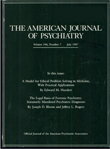Medication and psychotherapy in the treatment of bulimia nervosa
Abstract
OBJECTIVE: Two treatments for bulimia nervosa have emerged as having established efficacy: cognitive-behavioral therapy and antidepressant medication. This study sought to address 1) how the efficacy of a psychodynamically oriented supportive psychotherapy compared to that of cognitive-behavioral therapy; 2) whether a two-stage medication intervention, in which a second antidepressant (fluoxetine) was employed if the first (desipramine) was either ineffective or poorly tolerated, added to the benefit of psychological treatment; and 3) if the combination of medication and psychological treatment was superior to a course of medication alone. METHOD: A total of 120 women with bulimia nervosa participated in a randomized, placebo-controlled trial. RESULTS: Cognitive-behavioral therapy was superior to supportive psychotherapy in reducing behavioral symptoms of bulimia nervosa (binge eating and vomiting). Patients receiving medication in combination with psychological treatment experienced greater improvement in binge eating and depression than did patients receiving placebo and psychological treatment. In addition, cognitive-behavioral therapy plus medication was superior to medication alone, but supportive psychotherapy plus medication was not. CONCLUSIONS: At present, cognitive-behavioral therapy is the psychological treatment of choice for bulimia nervosa. A two-stage medication intervention using fluoxetine adds modestly to the benefit of psychological treatment.



